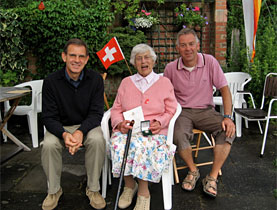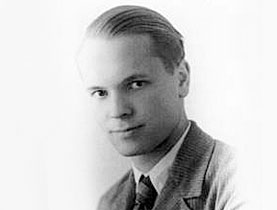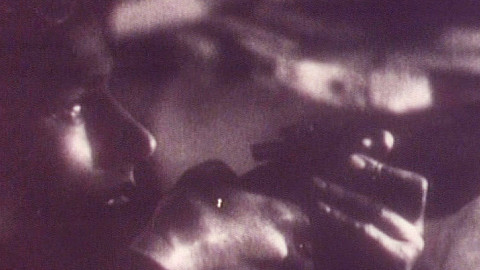Swiss au pair receives wartime medal

In 1939 many people made plans that didn't work out. Among them was 18-year-old Swiss girl Nelly Reinhardt, who travelled to Scotland to work as an au pair.
More than 60 years later Nelly, whose married name is Robson, has been awarded a special medal by the British government to commemorate her wartime service.
Robson and her friend Ida Klauser planned to stay in Scotland for a year to learn English, but when the Second World War broke out, they were stuck overseas.
The young women ended up serving in the Women’s Land Army as agricultural labourers for the duration of the war.
At 87, she is one of only 4,000 Land Army “girls” still alive. In 1943 about 80,000 young women worked in British fields while the men were away on duty.
Robson told swissinfo she was delighted with the honour but she wished more of her fellow workers could have enjoyed the recognition too.
“We should have had it a long time ago because lots of my friends are now gone,” she said. Klauser died more than 20 years ago.
Robson spent her childhood in the small village of Stein in Appenzell, where her father was a cheese maker.
The placement to Britain was arranged by an agency in Zurich. “I didn’t know anything about Scotland at all. This lady in Zurich said there was a place there – Dumfries – we had to look it up on the map.”
Censored letters
It was spring 1939 and the girls travelled by train. Five months later Europe was at war.
The Swiss newcomers began working as maids in a large manor house.”The lady of the house taught us English; the children were grown up. We were just doing housework,” she said.
“They had open fires and we had to rake out the fires every morning and clean the house and prepare breakfast. We were cleaning all the time. It was a big, big house.”
The girls communicated with their families by post and had to report regularly to the police.
“The letters were censored. There used to be black across the letters if we wrote home something we shouldn’t. We had to be indoors by ten o’clock every night. The police used to watch what we were doing.”
Work at the manor house was dull and the two girls began to look for other options.
“We wanted to join something to help the war effort and somebody advised us to go into the Land Army. The local police found a place with a farmer who needed help because his staff had to go to war.”
No German
Robson and Klauser spent four years at the farm near Thornhill. “We did ploughing and sheep farming – everything to do with farming. It was a good life. We had it nice. Hard work but everybody was kind,” she said.
It was not always easy being identified as a German speaker during the war. “We were told by the police not to speak German to each other in public. People were suspicious, very suspicious at that time.”
Through Robson’s friendships with Scottish land girls working on a neighbouring farm, she met her future husband, Jim.
“He was in the Royal Navy and I was friendly with his sister. I got engaged before I left Scotland.”
“Scotland is home”
The couple kept in contact after the war and, to the dismay of her family, Robson left Switzerland for good in 1948. The couple went on to have two sons and four grandchildren and she has remained in the area of the Scottish Borders ever since.
“He was a seafaring man and loved the sea. He went back to the sea on a merchant ship afterwards. Switzerland wasn’t the right country for him,” she said.
After so many years in Scotland, Robson speaks with a strong Scottish accent and is firmly attached to her adopted country. She lives five minutes from her son Denis and has “a happy life”.
“Scotland is my home now. Because my family is here I wouldn’t change it. My husband died in 1980 and my friends thought I might go back, but my family is here and I’m very much Scottish now.”
She does, however, keep up ties with her homeland by visiting Switzerland every year and by being an active member of the Swiss club in Edinburgh.
“We go on outings and have interesting talks. Just talking together in Swiss-German is nice,” she said.
The British Women’s Land Army was established during the First World War but was re-founded again shortly before the outbreak of the Second World War.
There was a need for extra agricultural labour to replace the male farm workers who were expected to join the army.
Women were initially asked to volunteer for the Land Army, however after 1941 limited conscription came into force, initially for single women between 20 and 30 and widows without children.
All of the women worked long hours for low pay and were expected to learn on the job. They either lived on the farms or in hostels.
The Land Army was disbanded in 1950.

In compliance with the JTI standards
More: SWI swissinfo.ch certified by the Journalism Trust Initiative











You can find an overview of ongoing debates with our journalists here . Please join us!
If you want to start a conversation about a topic raised in this article or want to report factual errors, email us at english@swissinfo.ch.